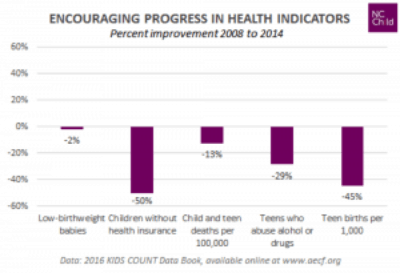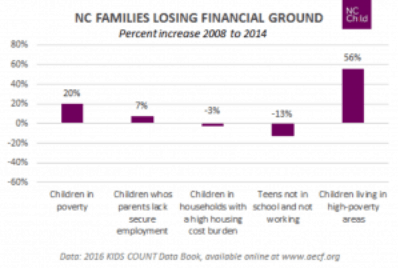In areas where North Carolina children and families are flying high, as well as those where they falter, there’s a strong link between public policy decisions and well-being outcomes.
The latest KIDS COUNT Data Book shows young people born in the mid-to-late 90s are exhibiting healthier behaviors and avoiding health risks in record numbers.
Fewer teens are giving birth, misusing alcohol and drugs, or failing to graduate on time. This is welcome news since research shows teens who achieve these milestones — delayed childbirth, graduating from high school, and adopting healthy habits — are best positioned to successfully transition to adulthood.

Strategic policy decisions like investments in teen pregnancy prevention programs have roughly halved the teen birth rate since 2008, and annual support for the Healthy Babies Bundle has contributed to an improvement in birth outcomes. Together, these policies have facilitated a culture of health that allows North Carolina children and youth to live increasingly healthy lives. Child health has also been bolstered by investments in Medicaid and NC Health Choice that have enabled North Carolina to reach a 95 percent child health insurance coverage rate despite declining access to employer-sponsored coverage among families. Evidence-based policies like seatbelt laws, the graduated drivers license, and bicycle helmet regulations have reduced the child and teen death rate by 13 percent since 2008.
The message from these successes is clear: when North Carolina invests in its children, it makes a measurable difference.
The Data Book also shows our children face harsher economic circumstances than their parents, to the detriment of their long-term prospects.
Half of all children in North Carolina live in poor or near poor homes, and for children of color that number jumps to roughly 7 in every 10. Thirty percent of children live in households with an unemployed parent. The declining economic security of families in North Carolina is compounded by the fact that they are increasingly likely to live in neighborhoods that offer few resources to promote children’s healthy growth and development. The percentage of children living in high-poverty communities in North Carolina has increased 56 percent since 2008, more than twice the growth for the national average.

The economic security of families in North Carolina has been impaired by policy decisions to divest from critical programs that protect many low-wage families from slipping below the federal poverty line. In 2014, North Carolina became the first and only state to eliminate the Earned Income Tax Credit, a refundable tax-credit that provided a much needed financial boost to families with tight household budgets. At the time of its sunset, the Earned Income Tax Credit reached more than 1 million taxpayers and 1.2 million children statewide, putting more than$100 million dollars back into the pockets of low-wage families and communities.
Given these circumstances it’s no surprise that North Carolina ranks a low 34th in the nation for overall child well-being, despite the fact that children in the state are doing increasingly well in education and health.
The well-being of children and youth is profoundly shaped by their homes and communities. But this year’s Data Book shows North Carolina families cannot do it alone. Public policies can (and should!) help enrich the environments where children live, learn, and grow, in order to strengthen the resources available to families as they strive to provide safe, healthy, and financially secure homes.
Just as North Carolina has invested in health and reaped generous returns as a result, the state must develop a bold vision to address the growing family economic hardship that limits opportunity for our children. Investments in evidence-based policies that make work pay for low-wage earners like a state Earned Income Tax Credit, that enable workers to stay on the job like childcare subsidies, and that promote financial peace of mind for poor or near poor families by safeguarding against costly medical emergencies like Medicaid Expansion could all make a measurable difference in lives of North Carolina children and youth.
To learn more about state and national trends in child well-being, read the 2016 KIDS COUNT Data Book online at www.aecf.org. Click here to view a profile of North Carolina state data.




